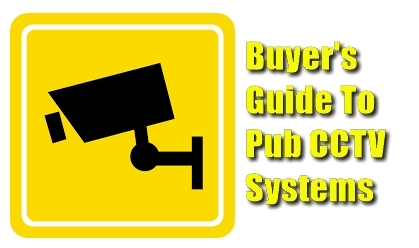“Big Brother is watching you” – George Orwell – “1984”
Many pubs are now required, as part of their premises licence, to have a Closed Circuit TV (CCTV) system installed and the images recorded for up to 30 days for use by the police. Many pubs also use these systems to help protect critically vulnerable areas of the business – over tills, store rooms, delivery points etc.
This guide will help you in the choice of a video surveillance camera system in your pub; it has information to help in the design of your video surveillance system, select the products that best fit your CCTV system needs, and help make key installation decisions that will save you time and money. The guide also has a section on your legal responsibilities under the Data Protection Act.
There are many details to consider when specifying the correct CCTV Camera System. Professional video surveillance is not a cheap undertaking and a budget should be outlined and the best possible system should be considered. This guide will help you to review camera and recording system for your CCTV and video surveillance requirements.
The first task in a successful CCTV project is to outline the key CCTV objectives:
- How many cameras are required?
- What are the key Field(s) of View?
- What are the recording requirements?
- What are the lighting conditions of each camera location?
- Where do I need live video monitoring or a second video monitor?
- How long do you need to retain the video files?
Cameras
There are specific cameras that need to be selected based on the field of view, lighting conditions, and the mounting location of the camera. There is no such thing as a one-size fits all in the successful CCTV project. It is important to note each camera location and select the camera best suited for that location.
Answer these questions:
- Is the camera to be sited indoors or outdoors?
- What are the lighting conditions (during day and night)?
- Where are my mounting locations?
